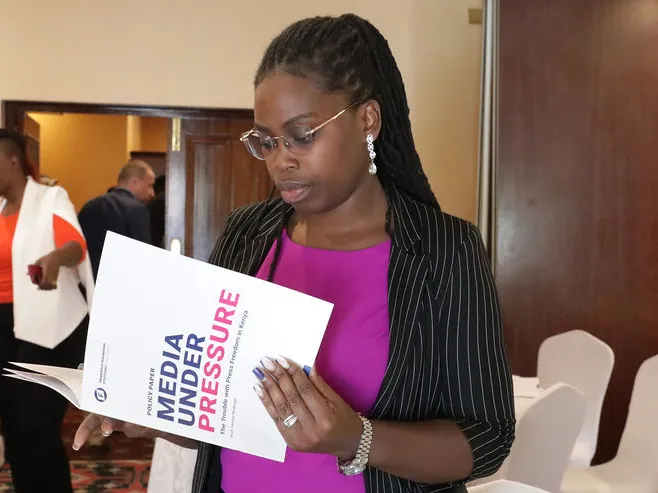The Kenyan government is under scrutiny for its perceived failure to uphold press freedom, prompting calls from media stakeholders for journalist unity to safeguard and expand the space for independent journalism.
This comes a year after the controversial killing of Pakistani journalist Arshad Sharif in Kenya on October 23, 2022.
The Kenyan police acknowledged responsibility for Sharif’s death, attributing it to a mistaken shooting by the General Service Unit at Sharif’s car.
However, a year has passed since the incident, and no police officer has been held accountable, causing frustration among professional journalism associations and unions.
“So, Kenya is absolutely on the spot globally this week. Of course, the government admitted this gentleman (Arshad Sharif) was killed by police, but the same government cannot go and apprehend the officers, which will kill the editor,” Erick Oduor, Secretary General of the Kenya Union of Journalists, disclosed.
Sharif’s widow, Javeria Siddique, has taken legal action against Kenya’s Attorney General, the National Police Service, and the Director of Public Prosecutions for their failure to investigate the matter.
She is demanding an apology, transparency, and acceptance of responsibility for her husband’s death.
Investigations into the matter were halted in September 2023 after the Director of Public Prosecutions was found to lack interest in the case due to its failure to produce key suspects.
As Kenyan media stakeholders gathered in Nairobi to launch a policy paper titled ‘Media Under Pressure: The Trouble with Press Freedom in Kenya’ by the Friedrich Naumann Foundation (FNF) on Friday, October 27, they called for swift prosecution of suspects in Sharif’s death.
Martin Masai, Trustee of the Kenya Editors Guild (KEG), criticized the government’s lack of commitment to upholding constitutional provisions on media freedom.
He urged for a proper framework to engage the government in protecting media freedoms.
Kenya Union of Journalists (KUJ) Secretary General Erick Oduor expressed hope that the court will compel the government to take action by producing the suspects.
The report authored by Professor George Nyabuga of Aga Khan University Graduate School of Media and Communications revealed that the media is facing an existential threat due to economic instability and laws that contravene explicit media freedom as stated in the Constitution of Kenya 2010.
The report highlighted financial, existential, political, and technological challenges that prevent media from operating freely and independently.
Nyabuga pointed out that insufficient funds for salaries are detrimental to media freedoms because human resources are key to free media.
He also criticized laws like the Computer Misuse and Cybercrimes Act No. 5 of 2018 that justify criminalizing defamation against Article 34 of the Constitution of Kenya.
“Several laws limit press freedom. For example, you know, the Computer Misuse and Cyber Crimes Act of 2018, has raised serious concerns because it’s often used to justify the arrest and prosecution of those using their mobile devices on computers for reporting purposes or to write critical government articles.”
The paper emphasized unity among media stakeholders in lobbying for better policies that will protect press freedoms.
This unified approach must involve journalists’ associations, civil society organizations, and the international community.
The paper proposed engaging parliament to repeal laws compromising media freedoms and approve legislation exempting journalists and media houses from exorbitant taxes on newsprint and other equipment while offering incentives for training.
Judy Kaberia, FNF Senior Project Manager, stated that journalists cannot afford silence when media freedom is under threat from all sides.
Julia Majale, Managing Director of TUKO.co.ke, agreed with Kaberia that the media must stand up for itself.
“From a government official’s point of view, there is press freedom. From a government supporter’s point of view, the press has been given too much freedom, and it is abusing it to attack them. However, the media is the wearer of the shoe and knows where it pinches; therefore, it is well-placed to fight for its rights,” Majale explained.
She said that media capture revolves around money, legislation, and technology.
“It is easy for the media to prioritize who butters the bread. Dwindling revenue means job cuts for journalists, who will subsequently fall for brown envelopes. There’s a conflict on which policies should govern press freedom, and the institution of legal suits and gagging orders limits press freedom just as government officials bully the media with anti-press freedom pronouncements,” she added.
By Michael Olinga, Senior Editor, Tuko.co.ke




